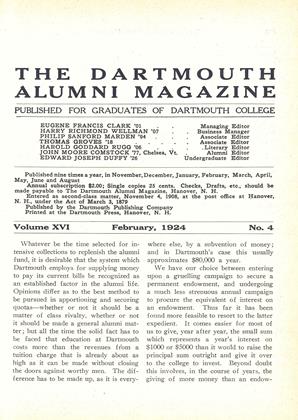Dr. Charles Parker Bancroft, until his sud den death last month, consultant in mental hygiene, at Dartmouth, was the subject of an appreciative editorial in a recent issue of TheManchester Union, which the ALUMNI MAGAZINE herewith reprints.
"To Dr. Charles Parker Bancroft befell the rare good fortune of doing his most enjoyable, hopeful work in the latter part of an extremely active and influential life. He himself was deeply conscious of this. Not soon will the present writer forget the animation with which he responded to this very statement of his case made in the editorial room of The Union only a few weeks ago. Comment was made on the fact that after many years of professional work amongst the insane, most of whom were beyond hope or help, he was engaged most especially in aiding young men in overcoming their mental difficulties, regaining their grip, getting their direction. And Dr. Bancroft seized the idea, and for a few minutes showed the results and the possibilities of mental hygiene as no layman could possibly do, and frankly told of his personal satisfaction over able to devote the remainder of his active life to this altogether hopeful work.
"Perhaps it was not generally known that for three years Dr. Bancroft had been employed a great part of the time at Dartmouth College as consultant in mental hygiene, working in close co-operation with the director of personnel research, Prof. Richard W. Husband. In a college undergraduate body of two thousand young men a great number and wide variety of abnormal mental states are practically certain to develop. Twenty years ago, indeed much more recently than that, little of practical value could be done for the young men who, let us say, after going along steadily and successfully with their work suddenly slumped, lost interest, disclosed unsuspected tendencies in wrong directions. The new science of mental hygiene is precisely fitted for use in just these cases. Dr. Bancroft was one of the leaders in the mental hygiene movement, and for these last three years he has been applying all his surpassing knowledge of mental pathology to preventive work at the college —examining cases in their very beginnings, and helping scores of young men who but for such help might have made shipwreck of their lives at the beginning of their voyage.
"It was beautiful work, hopeful, stimulating, enjoyable work, and Dr. Bancroft enjoyed it immensely. And this despite his passing into what Dr. Tucker some twenty years ago described as the 'reserved time,' the time beyond the seventieth birthday anniversary which may well be given up largely to thinking over an active past and formulating and organizing together the abiding things it has taught. On the threshold of his seventy-third year, in full possession and enjoyment of the enthusiasm of youth, capable of all the concentration of powers characteristic of a man at the peak and prime of life, rich in the experience of age, happy in having hopeful work to do, Dr. Bancroft was pioneering far out in the advance line of the mental hygiene movement and applying his scientific knowledge where it could do its utmost measure of good, within a liberal arts college group.
"This is not all, of course, but the rest is common knowledge—his great service to the state hospital, his authorship of many useful books and treaties, his active participation in industrial and financial enterprises, his wide social connection, his valuable welfare work, withal, his genial companionableness. It is all a fine memory, now. But to us the outstanding feature of this unusually full life is this 'reserved time' service on behalf of college youth As these words are written, we see his animated face, we hear his vibrant voice, we note once more the indefinable evidences of absorbing interest as he takes us through case after case and shows how mental ruin has been averted.
"And what a sense of loss sweeps over us as we realize that we are seeing and hearing memory images—that this wonderfully hopeful work is over."
Dr. Charles P. Bancroft
 View Full Issue
View Full Issue
More From This Issue
-
 Article
ArticleWhatever be the time selected
February 1924 -
 Article
ArticleDARTMOUTH IN THE SEVENTIES
February 1924 By Samuel L. Powers '74 -
 Article
ArticleDARTMOUTH JOTTINGS OF A SOMEWHAT DESULTORY READER
February 1924 By Fred Lewis Pattee '88 -
 Class Notes
Class Notes$1000 REWARD PEARL NECKLACE
February 1924 -
 Article
ArticleHARRY HARMON BLUNT
February 1924 By Thomas Dreier -
 Article
ArticleFROM THE UNDERGRADUATE CHAIR
February 1924
Article
-
 Article
Article1937 Alumni Fund
October 1937 -
 Article
ArticlePresident's Dinners
MARCH 1963 -
 Article
ArticleDartmouth Authors
DECEMBER • 1986 By C. E. Widmayer -
 Article
ArticleHockey
February 1958 By CLIFF JORDAN '45 -
 Article
ArticleTHE COLLEGE MAN IN INDUSTRY
December, 1912 By Frederick Kenyon Brown '10 -
 Article
ArticleThree for the Road
MAY 1999 By Kevin Whitcher '99


